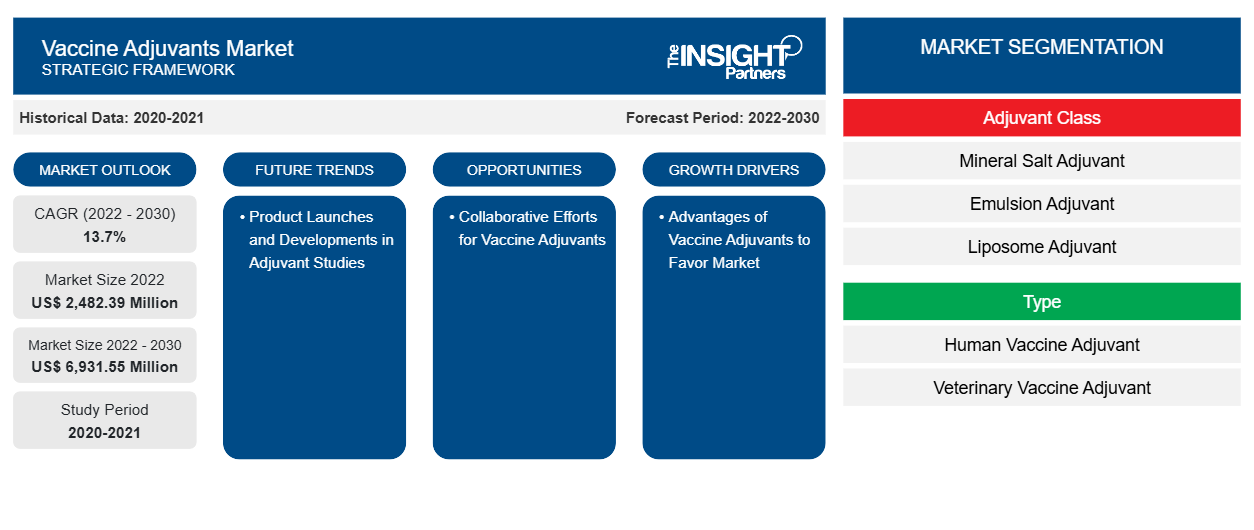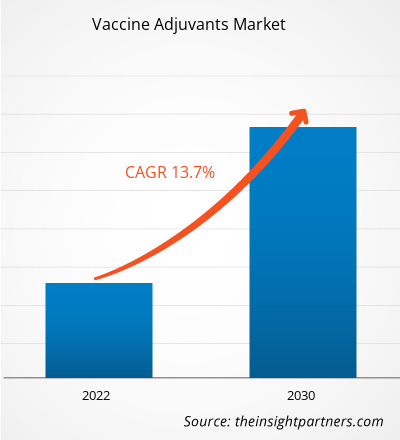Vaccine Adjuvants Market Dynamics and Trends by 2030
Vaccine Adjuvants Market Size and Forecast (2020-2030), Global and Regional Share, Trend, and Growth Opportunity Analysis Report Coverage: By Adjuvant Class (Mineral Salt Adjuvant, Emulsion Adjuvant, Liposome Adjuvant, and Others), Type (Human Vaccine Adjuvant and Veterinary Vaccine Adjuvant), and Geography
Historic Data: 2020-2021 | Base Year: 2022 | Forecast Period: 2022-2030- Report Date : Jan 2024
- Report Code : TIPRE00004430
- Category : Life Sciences
- Status : Published
- Available Report Formats :


- No. of Pages : 155
The Vaccine Adjuvant market size is projected to grow from US$ 2,482.39 million in 2022 to US$ 6,931.55 million by 2030; the market is estimated to record a CAGR of 13.7% during 2022–2030. Technological advancements is likely to remain key trends in the market.
Vaccine Adjuvants Market Analysis
In 2020, NIAID established Vaccine Adjuvant Compendium (VAC) for the collaboration between broader scientific community and NIAID-supported vaccine adjuvant researchers. This network-based tool displays adjuvant characteristics to assist vaccine makers to identify suitable adjuvants for target disease. Also, support various government authorities to foster vaccine adjuvant R&D, top manufacturers collaborations, and product launches through such business strategies are likely to provide profitable opportunities for the growth of the vaccine adjuvants market during the forecast period.
Vaccine Adjuvants Market Overview
Vaccine Adjuvant Technology encompasses nanotechnology, and its production includes supercritical, critical, or near-critical fluids with or without polar cosolvents such as ethanol [referred to as superfluids (SFS)]. Biodegradable biopolymers are dissolved in SFS and mixed with subunit vaccines in an aqueous solution or as a slurry of nanoparticles. Therefore, such new vaccine adjuvant technologies are being developed to make biodegradable polymer nanospheres (PNS) through novel processes, which allows vaccine manufacturers to rule out the use of organic solvents.
Customize This Report To Suit Your Requirement
Get FREE CUSTOMIZATIONVaccine Adjuvants Market: Strategic Insights

-
Get Top Key Market Trends of this report.This FREE sample will include data analysis, ranging from market trends to estimates and forecasts.
Vaccine Adjuvants Market Drivers and Opportunities
Advantages of Vaccine Adjuvants to Favor Market
In recent years, adjuvant vaccines have been developed to enhance humoral and cell-mediated immune response after vaccination. By adding adjuvant components, vaccine efficacy is improved. The primary mechanisms of actions of the newer adjuvants involve enhancement of the innate immune system and lead to improved humoral and cell-mediated immunity against infections in populations.
Product Launches and Developments in Adjuvant Studies
Over past decades, non-biogenic adjuvants, biogenic adjuvants, and their multi-type of composite adjuvant materials studies are increasing, aiming at providing a theoretical basis for developing feasible and effective adjuvants for oral vaccines. With increasing studies related to vaccine adjuvants, strategic initiative are also happening in the market. For instance, In August 2023, Bimervax, the COVID-19 vaccine developed by the HIPRA Human Health, received approval from the Medicines and Healthcare Products Regulatory Agency (MHRA). Bimervax is part of the SARS-CoV-2 virus spike protein combined with an adjuvant acting as an additional ingredient designed to trigger a strong immune response. It can also be administered as a booster shot in the upper arm, particularly for those aged 16 years and over. Such approvals for vaccine adjuvants is likely to favor the market growth from 2020 to 2030.
Vaccine Adjuvants Market Report Segmentation Analysis
Key segments that contributed to the derivation of the vaccine adjuvants market analysis are adjuvant class and type.
- Based on adjuvant class, the vaccine adjuvants market is divided into mineral salt adjuvant, emulsion adjuvant, liposome adjuvant, and others. The mineral salt adjuvant segment held a larger market share in 2022.
- By type, the market is bifurcated into human vaccine adjuvant and veterinary vaccine adjuvant. The human vaccine adjuvant segment held the largest share of the market in 2022.
Vaccine Adjuvants Market Share Analysis by Geography
The geographic scope of the Vaccine Adjuvants market report is mainly divided into five regions: North America, Asia Pacific, Europe, Middle East & Africa, and South & Central America.
North America has dominated the market and Asia Pacific is anticipated to grow with the highest CAGR in the coming years. Rising infectious disease and pandemics contribute to accelerating vaccine adjuvant production in Asia Pacific, influencing market growth during 2022-2030. In India, there is high support from the National Institute of Health (NIH), which contributes to the production of vaccines. One such example is the adjuvant developed by NIH funding to enhance the efficacy of India's COVAXIN Alhydroxiquim-II vaccine. The adjuvant used in COVAXIN, named “Alhydroxiquim-II”, was discovered and tested in the laboratory by ViroVax LLC, by incorporating a small molecule attached to “Alhydrogel”, a substance commonly known as alum standing as the most common adjuvant used in the vaccines for people.
Vaccine Adjuvants Market Regional Insights
The regional trends and factors influencing the Vaccine Adjuvants Market throughout the forecast period have been thoroughly explained by the analysts at The Insight Partners. This section also discusses Vaccine Adjuvants Market segments and geography across North America, Europe, Asia Pacific, Middle East and Africa, and South and Central America.
Vaccine Adjuvants Market Report Scope
| Report Attribute | Details |
|---|---|
| Market size in 2022 | US$ 2,482.39 Million |
| Market Size by 2030 | US$ 6,931.55 Million |
| Global CAGR (2022 - 2030) | 13.7% |
| Historical Data | 2020-2021 |
| Forecast period | 2022-2030 |
| Segments Covered |
By Adjuvant Class
|
| Regions and Countries Covered |
North America
|
| Market leaders and key company profiles |
|
Vaccine Adjuvants Market Players Density: Understanding Its Impact on Business Dynamics
The Vaccine Adjuvants Market is growing rapidly, driven by increasing end-user demand due to factors such as evolving consumer preferences, technological advancements, and greater awareness of the product's benefits. As demand rises, businesses are expanding their offerings, innovating to meet consumer needs, and capitalizing on emerging trends, which further fuels market growth.

- Get the Vaccine Adjuvants Market top key players overview
Vaccine Adjuvants Market News and Recent Developments
The vaccine adjuvants market is evaluated by gathering qualitative and quantitative data post primary and secondary research, which includes important corporate publications, association data, and databases. A few of the developments in the vaccine adjuvants market are listed below:
- SPI Pharma Inc and Q-Vant Biosciences Inc partnered to combines Q-Vant's leadership in sustainable saponin extraction technology with SPI's global reach and servicing expertise in the pharmaceutical industry. This includes investment in expanding Q-Vant’s proprietary 100% sustainable Q-SAP technology and an exclusive commercial agreement to accelerate the global adoption of their saponin adjuvants for veterinary and human vaccine formulations. (Source: SPI Pharma Inc, Press Release, October 2023)
- Seppic launched MONTANIDE GEL P PR, an aqueous adjuvant based on a polymeric technology dedicated to avian injectable vaccines, meeting the need for innocuity in the avian market. In addition, MONTANIDE GEL P PR is particularly stable and can resist destabilising antigenic media frequently used in avian vaccines. (Source: Seppic, Press Release, May 2024)
Vaccine Adjuvants Market Report Coverage and Deliverables
The “Vaccine Adjuvants Market Size and Forecast (2020–2030)” report provides a detailed analysis of the market covering below areas:
- Vaccine adjuvants market size and forecast at global, regional, and country levels for all the key market segments covered under the scope
- Vaccine adjuvants market trends, as well as market dynamics such as drivers, restraints, and key opportunities
- Detailed PEST/Porter’s Five Forces and SWOT analysis
- Vaccine adjuvants market analysis covering key market trends, global and regional framework, major players, regulations, and recent market developments3
- Industry landscape and competition analysis covering market concentration, heat map analysis, prominent players, and recent developments for the Vaccine Adjuvants market
- Detailed company profiles
Frequently Asked Questions
Mrinal is a seasoned research analyst with over 8 years of experience in Life Sciences Market Intelligence and Consulting. With a strategic mindset and unwavering commitment to excellence, she has built deep expertise in pharmaceutical forecasting, market opportunity assessment, and developing industry benchmarks. Her work is anchored in delivering actionable insights that empower clients to make informed strategic decisions.
Mrinal’s core strength lies in translating complex quantitative datasets into meaningful business intelligence. Her analytical acumen is instrumental in shaping go-to-market (GTM) strategies and uncovering growth opportunities across the pharmaceutical and medical device sectors. As a trusted consultant, she consistently focuses on streamlining workflow processes and establishing best practices, thereby driving innovation and operational efficiency for her clients.
- Historical Analysis (2 Years), Base Year, Forecast (7 Years) with CAGR
- PEST and SWOT Analysis
- Market Size Value / Volume - Global, Regional, Country
- Industry and Competitive Landscape
- Excel Dataset
Testimonials
The Insight Partners' SCADA System Market report is comprehensive, with valuable insights on current trends and future forecasts. The team was highly professional, responsive, and supportive throughout. We are very satisfied and highly recommend their services.
RAN KEDEM Partner, Reali Technologies LTDsI requested a report on a very specific software market and the team produced the report in a few days. The information was very relevant and well presented. I then requested some changes and additions to the report. The team was again very responsive and I got the final report in less than a week.
JEAN-HERVE JENN Chairman, Future AnalyticaWe worked with The Insight Partners for an important market study and forecast. They gave us clear insights into opportunities and risks, which helped shape our plans. Their research was easy to use and based on solid data. It helped us make smart, confident decisions. We highly recommend them.
PIYUSH NAGPAL Sr. Vice President, High Beam GlobalThe Insight Partners delivered insightful, well-structured market research with strong domain expertise. Their team was professional and responsive throughout. The user-friendly website made accessing industry reports seamless. We highly recommend them for reliable, high-quality research services
YUKIHIKO ADACHI CEO, Deep Blue, LLC.This is the first time I have purchased a market report from The Insight Partners.While I was unsure at first, I visited their web site and felt more comfortable to take the risk and purchase a market report.I am completely satisfied with the quality of the report and customer service. I had several questions and comments with the initial report, but after a couple of dialogs over email with their analyst I believe I have a report that I can use as input to our strategic planning process.Thank you so much for taking the extra time and making this a positive experience.I will definitely recommend your service to others and you will be my first call when we need further market data.
JOHN SUZUKI President and Chief Executive Officer, Board Director, BK TechnologiesI wish to appreciate your support and the professionalism you displayed in the course of attending to my request for information regarding to infectious disease IVD market in Nigeria. I appreciate your patience, your guidance, and the fact that you were willing to offer a discount, which eventually made it possible for us to close a deal. I look forward to engaging The Insight Partners in the future, all thanks to the impression you have created in me as a result of this first encounter.
DR CHIJIOKE ONYIA MANAGING DIRECTOR, PineCrest Healthcare Ltd.Reason to Buy
- Informed Decision-Making
- Understanding Market Dynamics
- Competitive Analysis
- Identifying Emerging Markets
- Customer Insights
- Market Forecasts
- Risk Mitigation
- Boosting Operational Efficiency
- Strategic Planning
- Investment Justification
- Tracking Industry Innovations
- Aligning with Regulatory Trends




















 Get Free Sample For
Get Free Sample For